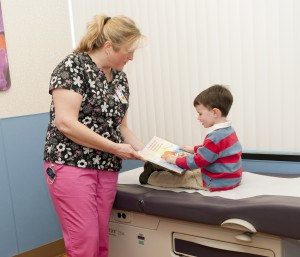It’s hard to get little ones excited about going to the doctor, but Lily Mae and Janie Davis look forward to their annual checkups at UVA’s Augusta Pediatrics in Fishersville. That’s because the sisters, ages 5 and 3, get a new book at each appointment.

“They know,” says their mom, Hilary. “They say, ‘Am I going to get a book today?’”
Augusta Pediatrics is part of the national Reach Out and Read program, which promotes literacy by providing books for doctors and nurses to hand out to young patients in exam rooms. From their 6-month checkup through age 5, children get a new book. The national program distributes more than 6.5 million new books each year, and more than 28,000 medical providers participate in the program.
Jessica Simmons, MD, initiated the program when she arrived at Augusta Pediatrics in 2006 after seeing its success when she was a pediatric resident at UVA’s Primary Care Center.
Why Reach Out and Read?
Research shows that getting books into kids’ hands early and encouraging families to read really does work, says Simmons.
According to the literacy program’s national website:
- More than one-third of kids in this country go to kindergarten without the basic language skills that will help them learn to read.
- Low-income families might not have the money to buy books and those parents may not have been read to when they were young.
Haley Wysor, LPN, who has coordinated the program at Augusta Pediatrics for 3 ½ years, says about 30 percent of the patients at the practice are Medicaid recipients.
Wysor organizes the books by age, using a color code so doctors and nurses can quickly and easily find the right books for each child. She says Augusta handed out 1,500 books to children, regardless of income, in the last six months. Some books are donated by book publisher Scholastic, and Augusta Pediatrics also applies for grants to pay for other books.
Developmentally Appropriate Books for Children
The program provides developmentally appropriate books. For instance, 6-month-olds get board books that are sturdy and easy for little hands to use, while preschoolers get counting and alphabet books.
“I think the kids enjoy it. I think we have people who need it here in terms of demographics,” says Simmons. “It’s such a pleasure to get a new book.”
As a pediatrician, Simmons is able to do a developmental assessment when she gives a child a book. She can see how the child handles the book and if he’s interested in it. “We see how excited the parent is,” she says. “Do they sit with the child and turn the pages of the book or do they put it in their bag?”
Mom Hilary Davis, who lives in Staunton, appreciates that her girls receive age-appropriate books.
“I still remember the first book Lily Mae got from the program,” she says. The book — “Baby Faces” — was a board book featuring photos of babies making different faces (happy, sad, puzzled, etc.). “They loved that book. They love all of their books. It was definitely worn out by the time they were done with it.”
Davis says her little girls have plenty of books at home, but they’re still excited to get a new book at the doctor’s office.
“We always make sure that the books are reachable in our house,” Davis says. “They read most every day typically. We try to read a book every night.”
But Davis knows that not all families are so fortunate.
“For a child that doesn’t have very many books, it puts a book in their hands,” Davis says. “It’s good for parents that don’t typically read to their kids. It encourages them.”
A Welcome Distraction for Excited Young Readers
The books often distract children from the scary things that sometimes come with a visit to the doctor.
Wysor says one little girl recently visited Augusta Pediatrics for her 5-year-old well check. She was nervous about getting shots, but she was also happy about getting a new book. “She said, ‘I’m getting a book! I’m getting a book!’” Wysor says. “It really does make their day. It makes you feel good when they’re leaving and the child has the book in their arms,” she says.
Simmons says the program chooses “wonderful books. I get so excited about them. They’re quality books.”
And Simmons isn’t just a pediatrician. She’s a mom to three young children who are patients at Augusta Pediatrics. “I love it when I come here with my kids and they get a new book,” she says.
Reading Advice for Parents
When she’s talking to parents at well-child visits, Simmons encourages them to take an active role in their child’s reading development.
Here’s her advice for parents:
6-12 Months: Now is a great time to start reading to your child. It’s a bonding time. It’s OK if they put the book in their mouth. Point to pictures and name objects. Your child may only want to read for two minutes tops — that’s ok. Try again later. Just make it routine.
Age 1-2: Ask, “Where’s the __?” and let your child point to the object. Choose books that your child is interested in, even if you don’t want to read about the same thing all day long!
Age 2-3: Read books at bedtime. Ask, “What’s that?”
Age 3-5: Change from asking, “What’s that?” to asking, “What is happening?” Let your child tell you the story.
Get More Information
Pediatric Services at UVA:
- Make an appointment for your child at Augusta Pediatrics.
- Learn more about all of our pediatric services and locations at UVA.
Augusta County Library:
- The Augusta County Library has weekly story times, puppet shows and other programs for youngsters. Find out more.
Reach Out and Read:
- Find out more about the national Reach Out and Read program.
Volunteer:
- Children, Youth and Family Services of Charlottesville is looking for volunteers to help young children develop good reading skills.